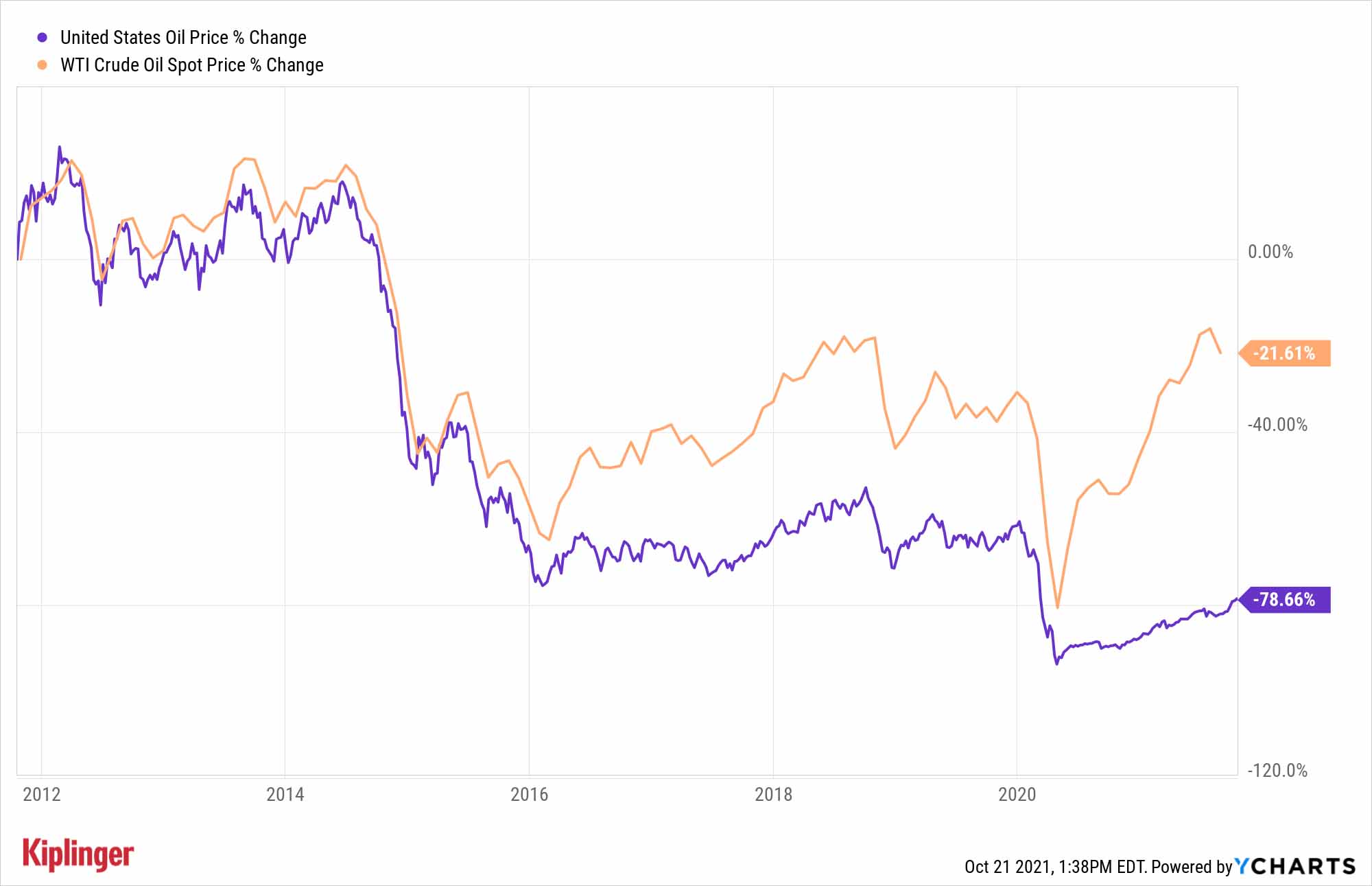Should You Buy the ProShares Bitcoin Strategy ETF (BITO)?
The first Bitcoin futures ETF broke an 18-year-old record by amassing more than $1 billion in two days. So it's popular … but is it for you?


Profit and prosper with the best of Kiplinger's advice on investing, taxes, retirement, personal finance and much more. Delivered daily. Enter your email in the box and click Sign Me Up.
You are now subscribed
Your newsletter sign-up was successful
Want to add more newsletters?

Delivered daily
Kiplinger Today
Profit and prosper with the best of Kiplinger's advice on investing, taxes, retirement, personal finance and much more delivered daily. Smart money moves start here.

Sent five days a week
Kiplinger A Step Ahead
Get practical help to make better financial decisions in your everyday life, from spending to savings on top deals.

Delivered daily
Kiplinger Closing Bell
Get today's biggest financial and investing headlines delivered to your inbox every day the U.S. stock market is open.

Sent twice a week
Kiplinger Adviser Intel
Financial pros across the country share best practices and fresh tactics to preserve and grow your wealth.

Delivered weekly
Kiplinger Tax Tips
Trim your federal and state tax bills with practical tax-planning and tax-cutting strategies.

Sent twice a week
Kiplinger Retirement Tips
Your twice-a-week guide to planning and enjoying a financially secure and richly rewarding retirement

Sent bimonthly.
Kiplinger Adviser Angle
Insights for advisers, wealth managers and other financial professionals.

Sent twice a week
Kiplinger Investing Weekly
Your twice-a-week roundup of promising stocks, funds, companies and industries you should consider, ones you should avoid, and why.

Sent weekly for six weeks
Kiplinger Invest for Retirement
Your step-by-step six-part series on how to invest for retirement, from devising a successful strategy to exactly which investments to choose.
The ProShares Bitcoin Strategy ETF (BITO, $43.28) is officially a blockbuster.
Cryptocurrency proponents scored one of their largest badges of legitimacy recently when the Securities and Exchange Commission (SEC) allowed ProShares' new Bitcoin futures exchange-traded fund (ETF) to launch. That staunched a roughly eight-year stretch of failures – starting with the Winklevoss Twins' filing in 2013 – to get a cryptocurrency ETF not tied to equities approved by U.S. regulators.
BITO hit the exchanges on Oct. 19 to roaring demand, gobbling up $570 million in assets under management on its first day of trading. By the end of Day 2, ProShares' product toppled the billion-dollar mark and closed with $1.1 billion in AUM.
From just $107.88 $24.99 for Kiplinger Personal Finance
Become a smarter, better informed investor. Subscribe from just $107.88 $24.99, plus get up to 4 Special Issues

Sign up for Kiplinger’s Free Newsletters
Profit and prosper with the best of expert advice on investing, taxes, retirement, personal finance and more - straight to your e-mail.
Profit and prosper with the best of expert advice - straight to your e-mail.
That's a chunk of history: As Bloomberg Senior ETF Analyst Eric Balchunas points out, BITO eclipsed the SPDR Gold Shares (GLD) as the quickest ETF to pile up $1 billion in assets.
But should you throw your money into that $1.1 billion pool?
We'll help you make that decision. Let's delve into what this Bitcoin futures ETF does, as well as what the pros like about it – and what they don't.
A Bit on BITO
The ProShares Bitcoin Strategy ETF invests in cash-settled, front-month Bitcoin futures. ("Front-month" just refers to the contracts that will mature the soonest.) When those contracts mature, the ETF will buy up contracts for the next month. ProShares collects 0.95% in fees, or $95 on a $10,000 investment, for providing you with that access.
And … well, that's about it. BITO delivers a straightforward strategy that doesn't need much explaining.
What does require some conversation, though, is what kind of Bitcoin exposure you're getting – and what BITO means for cryptocurrency broadly.
The Pros of BITO and Bitcoin Futures ETFs
The launch of the ProShares Bitcoin Strategy ETF was widely celebrated across the crypto world, largely because it's the latest major instance of cryptocurrency being taken seriously by traditional financial markets.
Piper Sandler analysts Richard Repetto and Patrick Moley call it "another step in the walk towards greater 'crypto legitimacy' … as it brings more credibility and attention to the crypto space as a whole and will likely lead to higher volumes across the industry over time."
Repetto and Moley note that they've spoken with many management teams in recent months who have expressed interest in cryptocurrency offerings, but would like to see more regulatory clarity before taking action.
"We think that the tacit approval of a bitcoin futures ETF is a step toward providing that clarity for many," the analysts add.
In addition to opening the floodgates for money managers and advisers, BITO and other Bitcoin futures ETFs also could be a stepping stone for retail investors who have thus far neglected crypto as an asset class.
"ETFs offering crypto exposure can open the door to a whole new wave of crypto-curious investors," says Lindsey Bell, chief investment strategist for Ally Invest. "Crypto has been exciting for a while, but some have been hesitant to buy in because of the lack of transparency. Others have been skeptical about the mechanics of buying and selling pure coins."
Bitcoin futures ETFs, however, allow investors that are more comfortable with traditional vehicles such as brokerage accounts and IRAs to gain crypto exposure without having to hold or exchange the actual cryptocurrencies, she says.
There are other things to like about BITO and the ability to invest in crypto via ETFs:
- More liquidity in futures markets. "The futures markets offer deep liquidity with significantly more volume than the crypto markets," Repetto and Moley say. "For example, the Bitcoin futures market yesterday saw $62B in total volume, compared to $37B in Bitcoin's spot market trading volumes."
- Lower fees. "Investing in crypto has notoriously been an expensive process because of high fees and transaction costs. Bitcoin futures ETFs could offer a relatively low-fee solution," Bell says. BITO specifically is a huge step down in expenses from the most popular Bitcoin fund, the Grayscale Bitcoin Trust (GBTC), which charges 2.0% annually, or more than twice BITO's fee. (Just note that GBTC attempts to track spot prices, which is a different type of exposure than Bitcoin futures.)
- A door for institutional investors. Piper Sandler's analysts add that they "suspect many institutional investors are precluded from purchasing and holding spot crypto in their portfolios" – but they likely don't have rules prohibiting them from holding Bitcoin futures ETFs.
The Cons of BITO and Bitcoin Futures ETFs
If you want the "purest" form of exposure out of an ETF, you want to buy a fund that holds the underlying asset.
Want to invest in the S&P 500 Index? Buy an ETF that "tracks" the index by holding all of the index's underlying stocks at the same weights they carry in the index.
Want to invest in gold? Buy an ETF that simply holds physical gold.
Futures simply aren't the same thing. They're contracts that allow someone to buy or sell an asset at a predetermined price at a predetermined date. So futures are really more of a gauge of what people think the price of something could be in the future – but it's not the price itself. (Those looking to learn more about Bitcoin futures themselves should check out Lara Crigger's interview with ProShares Head of Investment Strategy Simeon Hyman.)
"It's a well-known fact in the ETF industry that futures-based funds do not provide returns that directly track the underlying asset," says Dave Abner, global head of business development at crypto exchange Gemini.
Take oil, for instance. The United States Oil Fund (USO), the largest U.S.-traded oil ETF, primarily invests in near-term West Texas Intermediate crude oil futures contracts. At times, it has tracked the price of oil somewhat faithfully.
At other times, it hasn't at all.

Two big reasons why futures-based ETFs can go astray:
- Contango: "Bitcoin futures have largely existed in a state of contango, in which the price of futures contracts increase as you move out in time, so these ETFs will likely have to sell out of expiring futures at a lower price and buy into new futures contracts at a higher price," explains Ally Invest's Bell.
- Cost of carry: "While the spot price of bitcoin is determined by supply and demand, futures prices are based on prevailing spot price plus the cost of carry before delivery," says Piper Sandler's Repetto and Moley. "The cost of carry can be a positive or negative and can fluctuate due to changes in supply and demand, stemming from anticipated announcements to pricing in possible future events."
Also worth noting is that while ProShares' BITO currently offers a cost-effective option compared to existing funds (as well as many ways to directly invest in crypto), it very well could be undercut by competitors rolling out new products over the next few months.
"In total, there are nine bitcoin futures-based ETFs being reviewed by the Securities and Exchange Commission (SEC), all with potential launch dates during the fourth quarter of 2021 including from large asset managers like ARK, Invesco, and VanEck and lesser-known ETF firms like Bitwise and Valkerie," Todd Rosenbluth, head of ETF and mutual fund research at independent analysis firm CFRA, in an Oct. 18 note. (Note: Invesco has since pulled its filing.) "While the first ETF of any investment style is likely to gain a liquidity advantage, we expect there to be fee competition as more products begin trading."
Bottom Line
ProShares' Bitcoin Strategy ETF's initial popularity and its historical significance are beyond question. Despite its flaws, Rosenbluth calls BITO "a milestone for the ETF industry." He's hardly alone in his view.
But an investment in BITO has to be made with your eyes wide open. This ETF might come close to tracking Bitcoin prices, but there is ample risk it might not. There's also the very real concern that the market could soon be flooded with products providing the same service for less.
In other words: If you want pure Bitcoin exposure, you're still best off getting a digital wallet and buying the cryptocurrency directly.
That said, in the absence of an ETF that holds "physical" Bitcoin – something that might be a ways off – BITO is one of the purest forms of crypto exposure you can get if you prefer to invest using a traditional brokerage account.
Profit and prosper with the best of Kiplinger's advice on investing, taxes, retirement, personal finance and much more. Delivered daily. Enter your email in the box and click Sign Me Up.
Kyle Woodley is the Editor-in-Chief of WealthUp, a site dedicated to improving the personal finances and financial literacy of people of all ages. He also writes the weekly The Weekend Tea newsletter, which covers both news and analysis about spending, saving, investing, the economy and more.
Kyle was previously the Senior Investing Editor for Kiplinger.com, and the Managing Editor for InvestorPlace.com before that. His work has appeared in several outlets, including Yahoo! Finance, MSN Money, Barchart, The Globe & Mail and the Nasdaq. He also has appeared as a guest on Fox Business Network and Money Radio, among other shows and podcasts, and he has been quoted in several outlets, including MarketWatch, Vice and Univision. He is a proud graduate of The Ohio State University, where he earned a BA in journalism.
You can check out his thoughts on the markets (and more) at @KyleWoodley.
-
 The New Reality for Entertainment
The New Reality for EntertainmentThe Kiplinger Letter The entertainment industry is shifting as movie and TV companies face fierce competition, fight for attention and cope with artificial intelligence.
-
 Stocks Sink With Alphabet, Bitcoin: Stock Market Today
Stocks Sink With Alphabet, Bitcoin: Stock Market TodayA dismal round of jobs data did little to lift sentiment on Thursday.
-
 Betting on Super Bowl 2026? New IRS Tax Changes Could Cost You
Betting on Super Bowl 2026? New IRS Tax Changes Could Cost YouTaxable Income When Super Bowl LX hype fades, some fans may be surprised to learn that sports betting tax rules have shifted.
-
 3 Major Changes Investors Must Prepare for in 2026
3 Major Changes Investors Must Prepare for in 2026A possible stock market bubble. Trump accounts. Tokenized stocks. These are just three developments investors need to be aware of in the coming months.
-
 Government Shutdown Puts IPO Resurgence at Risk
Government Shutdown Puts IPO Resurgence at RiskThe IPO market has been sizzling in recent months, but the government shutdown threatens to put a short-term halt to public offerings. Here's why.
-
 Is Crypto Investing Coming to a Credit Union Near You?
Is Crypto Investing Coming to a Credit Union Near You?Credit unions are getting in on crypto investing through partnerships with third-party platforms, but the risks to investors still apply.
-
 Mutual Funds Are About to Get the ETF Treatment. Here's What It Means for Investors
Mutual Funds Are About to Get the ETF Treatment. Here's What It Means for InvestorsThe SEC is expected to decide soon whether mutual funds from dozens of providers can be offered as ETF share classes.
-
 The GENIUS, CLARITY, and Anti-CBDC Acts: What Bitcoin Investors Need to Know
The GENIUS, CLARITY, and Anti-CBDC Acts: What Bitcoin Investors Need to KnowMovement on the crypto front at the federal level has the potential to usher in substantial change. Here's what it means for your portfolio.
-
 Cryptocurrency May be Coming to Your 401(k) with Rules Change
Cryptocurrency May be Coming to Your 401(k) with Rules ChangeCrypto may be coming to a 401(k) near you. Financial experts weigh in on whether retirement savers should take the plunge.
-
 Is It Too Late to Invest in Bitcoin?
Is It Too Late to Invest in Bitcoin?Bitcoin has been volatile in recent months, but several analysts believe the cryptocurrency will resume its winning ways. Should investors get in now?
-
 SEC Cracks Down on Misleading Fund Names: The Kiplinger Letter
SEC Cracks Down on Misleading Fund Names: The Kiplinger LetterThe Kiplinger Letter The SEC rules aim to crack down on so-called “greenwashing” — misleading or deceptive claims by funds that use ESG factors.
